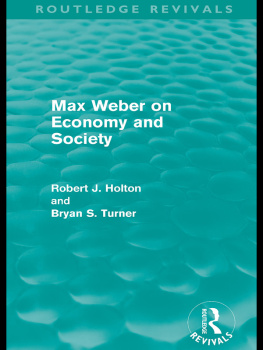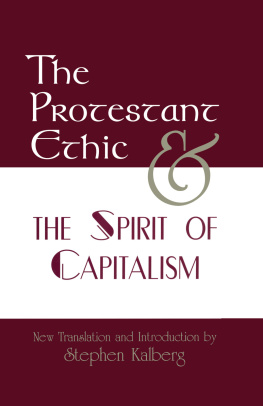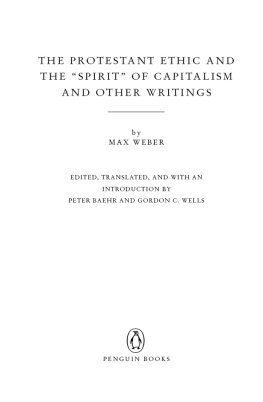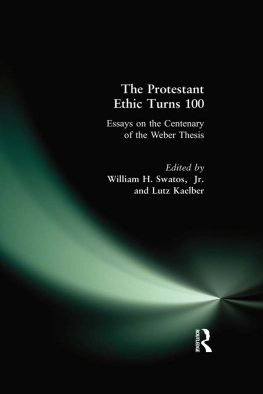First published in 1983
Reprinted in 2006 by Routledge 2 Park Square, Milton Park, Abingdon, Oxon, OX14 4RN
Transferred to Digital Printing 2007
Routledge is an imprint of Taylor & Francis Group, an informa business
1983 Stanislav Andreski
All rights reserved. No part of this book may be reprinted or reproduced or utilized in any form or by any electronic, mechanical, or other means, now known or hereafter invented, including photocopying and recording, or in any information storage or retrieval system, without permission in writing from the publishers.
The publishers have made every effort to contact authors and copyright holders of the works reprinted in the Weber series. This has not been possible in every case, however, and we would welcome correspondence from those individuals or organisations we have been unable to trace.
These reprints are taken from original copies of each book. In many cases the condition of these originals is not perfect. The publisher has gone to great lengths to ensure the quality of these reprints, but wishes to point out that certain characteristics of the original copies will, of necessity, be apparent in reprints thereof.
British Library Cataloguing in Publication Data
A CIP catalogue record for this book
is available from the British Library
Max Weber on Capitalism, Bureaucracy and Religion
ISBN10: 0-415-40214-X (volume)
ISBN10: 0-415-40210-7 (set)
ISBN13: 978-0-415-40214-9 (volume)
ISBN13: 978-0-415-40210-1 (set)
Routledge Library Editions: Weber
Max Weber on Capitalism, Bureaucracy and Religion
A Selection of Texts
Edited and in part newly translated by
STANISLAV ANDRESKI
Professor of Sociology, University of Reading
Texts: J. C. B. Mohr, Tubingen, 1920-1.
Translations: Stanislav Andreski; Routledge; New Left Books, 1983.
Selection, Editorial Work and Introduction, Stanislav Andreski, 1983.
This book is copynght under the Berne Convention. No reproduction without permission. All rights reserved.
First published in 1983
by Routledge
2 Park Square, Milton Park, Abingdon, Oxon, 0X14 4RN
270 Madison Ave, New York NY 10016
British Library Cataloguing in Publication Data
Weber, Max
Max Weber on capitalism, bureaucracy and religion.
1. Weber, Max 2. Sociology
I. Title II. Andreski, Stanislav
301'.092'4 HM22.G3W4
ISBN 0-04-301147-0
ISBN 0-04-301148-9 Pbk
Library of Congress Cataloging in Publication Data
Weber, Max, 1864-1920.
Max Weber on capitalism, bureaucracy, and religion.
Includes index.
1. Capitalism. 2. Bureaucracy. 3. Religion and sociology.
4. Protestantism;and capitalism.
I. Andreski, Stanislav. II. Title.
HB501.W4714213 1983 330.12'2 82-22760
ISBN 0-04-301147-0
ISBN 0-04-301148-9 (pbk.)
Set in 11 on 12pt Times by Photobooks (Bristol) Ltd
by Stanisiav Andreski
As there are already three or four volumes of readings in English from Max Weber, something must be said to justify an addition to their number. The present selection differs from its predecessors in two respects. The first is that it is centred on a theme instead of presenting a cross-section of Weber's works. The theme is not arbitrarily chosen but is one which presided over Weber's studies: namely, the question of why Western civilisation developed its unique characteristics. It can be seen from the preface to his study of Protestant ethics that he more or less equated this question with the problem of the rise of capitalism, the implicit premiss being that this was the pivot on which all the other unique features of the Occident hinged. In trying to explain this process Weber attributed the chief roles to bureaucracy and religion, or rather to their interaction with the economy. For this reason I think that the texts assembled here form a more harmonious whole than can be the case with selections without a single focus, and should give the reader a good idea of how Weber explains the rise of capitalism and the civilisation associated with it.
The second distinctive feature of this selection is that it includes only texts which can be understood without a careful and laborious exegesis of their meanings, based on a wide knowledge of philosophy, history and sociological theories. Luckily this criterion to a large extent coincides with the first, because Weber is most difficult to understand when he is treating the most abstract and general questions, and much easier to follow when he analyses a concrete historic case.
A third reason for compiling this volume was that I wished to make the texts clearer than those of most other translations. Though a great scholar and thinker, Weber was a thoroughly bad writer. Indeed, of all the great founders of the social sciences he scores the lowest for skill in presentation. In comparison with the lucidity and elegance of Adam Smith, John Stuart Mill, or de Tocqueville, Weber resembles a blunderbuss. Even within the Germanic cultural tradition where ponderous and convoluted style was regarded as a testimonial of academic respectability Weber seems more obscure than many other writers. Often he switches subjects in a most confusing manner. For instance, in one of the passages included in the present selection the main topic is the Chinese imperial administration. Into it is inserted a paragraph which compares it with certain arrangements in the medieval German Empire, but which is written in such a way that most readers would think that it is still the Chinese administration that he is talking about. Only with some knowledge of German historical terminology can one see that this paragraph must refer to the Holy German Empire and is inserted as a comparison. In my translation I have inserted the clarifying word where it was needed. There are many other examples of this kind of thing. However, whereas with many writers obscurity masks an emptiness of thought, with Weber it is always worthwhile forcing a way through the bush to the gold underneath. Even the parts which are not his best are worth studying carefully. He is convoluted, but never trivial or given to padding.
Some of the previous translations are acceptable but there are others which are seriously misleading. To understand an obscure writer calls for a considerable investment of effort in deciphering what he intends to say. The translation, moreover, should not be too literal, as this would make it even more difficult to understand than the original because of divergent stylistic conventions in the two languages. Especially when the aim is to make the thought of the author accessible to a wider public, the construction of the phrases must be thoroughly reorganised and the statements made more lucid. Unfortunately, it so happened that some of Weber's translators (notably Talcott Parsons) were themselves addicted to convoluted and opaque writing. When an obscure writer is translated by another obscure writer the result is obscurity to the square power, so to speak. What is even graver, the translators were often unable to solve the puzzles inherent in Weber's exposition no doubt because their thinking in general lacked logical rigour. The result is that in many translations there are sentences and entire paragraphs which make no sense whatsoever. I pity students who are instructed to study such texts and then examined on their understanding of the incomprehensible.











